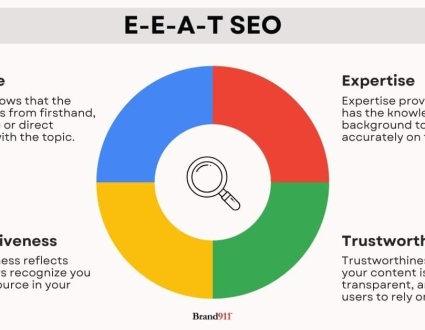Why Reputation Marketing Starts with Search
Your name is a search term.
Before someone hires you, partners with you, or refers you, they look you up. What they find—or don’t find—can shape how seriously they take you.
That’s why reputation marketing starts with search visibility.
It’s not about fixing a crisis. It’s about building on your strengths, owning your name in search results, and becoming the obvious choice in your field.
Whether you’re a founder, executive, or solo professional, you don’t just want to exist online. You want to show up with authority and build a strong personal brand that sets you apart from competitors.
This guide will show you how to use content, strategy, and SEO to control how you appear when someone searches for you—or someone like you.
Let’s walk through how to turn your online presence into a reputation asset.
How Search Engines Decide What (and Who) to Show First
When someone Googles your name, your business, or your area of expertise, the results they see aren’t random.
Search engines use hundreds of signals to decide what ranks on page one. If you want to build a visible, trusted online presence, you need to understand the basics of how those decisions are made.
Here’s what matters most:
- Relevance: Does your content answer the searcher’s question or need?
- Authority: Do trusted sources link to your content or mention you by name?
- Usability: Does your site load fast, work on mobile, and offer a smooth user experience?
Search is Intent-Driven
Google isn’t just matching words—it’s matching intent. If someone types “top executive coach Boston,” it knows they’re looking for someone credible and local. If they type your name, it wants to show a result that proves you’re legit.
If your business relies on local visibility, local SEO is crucial for appearing in these intent-driven searches.
That’s why content about your services, credentials, media mentions, and client results should be easy to find—and optimized to appear when people search for them.
E-E-A-T is the New Standard
Google prioritizes EEAT SEO, which means content should demonstrate:
- Experience: Have you done the work?
- Expertise: Do you know what you’re talking about?
- Authoritativeness: Do others recognize you as a leader?
- Trustworthiness: Are you transparent, consistent, and legit?
When your digital presence shows these qualities clearly, search engines are more likely to reward you with visibility. And when that happens, the people searching for you are more likely to trust what they see.

Leverage Your Reputation to Dominate Search Results
If you already have a strong brand reputation offline, the next step is to make sure it shows up online.
Search engines can’t promote what they can’t find. So the key to building visibility is turning your real-world accomplishments into searchable, indexable, and authoritative content.
Proactive online brand protection ensures that the right content shows up—and the wrong content stays buried.
Here’s how to start:
Make Your Name a Brand
- Use your full name consistently across your website, bios, and profiles
- Secure a domain name that matches your name or brand
- Claim and complete your public profiles (LinkedIn, Google Business, Crunchbase, etc.)
Learn how to rank for your name to take control of your personal search results.
Showcase What You’re Known For
- Publish content that highlights your work—case studies, awards, press, partnerships
- Create service pages or blog posts around your niche and industry terms
- Turn speaking engagements, interviews, or media mentions into SEO-friendly assets
Own More of Page One
- Launch a personal website if you don’t already have one
- Create supporting content on trusted platforms (e.g. Medium, Substack, podcast appearances)
- Build out your presence on high-ranking directories and profile sites
If someone Googles your name, your best work should be front and center. If it’s not, you’re leaving visibility—and opportunity—on the table.
Strategies to Leverage Your Online Presence for Search Engine Visibility
1. Keyword Strategy for Professionals Who Want to Be Found
Want to show up for the right searches? You need to know what your audience is actually typing into Google.
That’s where keyword strategy comes in—not as a list of buzzwords, but as a way to connect your name and expertise with what people are actively searching for.
Start with What You Want to Be Known For
Think beyond job titles. Think:
- What do you want to be found for?
- What terms describe your services, skills, or niche?
- What kinds of clients or opportunities are you trying to attract?
Examples:
- “Healthcare consultant for startups”
- “Entertainment attorney in Los Angeles”
- “Speaker on workplace culture”
These are more specific—and more searchable—than vague phrases like “consultant” or “keynote speaker.”
Use Long-Tail and Intent-Based Keywords
Longer search phrases are more targeted and often less competitive. Someone searching:
- “How to get featured in Forbes as a founder”
- or “Personal branding for executives”
…is likely looking for exactly what you offer.
Focus on keywords tied to intent:
- Informational: Search terms used when someone is looking to learn something.
- Navigational: Search terms used to find a specific website, brand, or person.
- Commercial: Search terms used when someone is comparing options or exploring services.
- Transactional: Search terms used when someone is ready to act—buy, sign up, or hire.

Free Tools to Build Your List
- Google Autocomplete: Type in your topic and see what comes up
- People Also Ask: Find common questions in your niche
- Google Search Console: See what you already rank for
- AnswerThePublic: Explore how real people search for your topic

Google autocomplete suggestions can help you discover what people are searching for.
The goal isn’t just to drive traffic. It’s to attract people who are already looking for someone like you.
2. Create Content That Positions You as an Authority
Content is how you prove your credibility online. It’s not just about writing blogs—it’s about showing you know your stuff and offering real value to the people searching for it.
The right content builds trust, earns attention, and improves your search visibility over time. Get started with SEO-friendly blogging to create content that ranks and resonates.
Focus on Topics That Reflect Your Expertise
Ask yourself:
- What questions do people ask me all the time?
- What do I want to be known for in my industry?
- What insights can I share that others aren’t?
Turn your answers into:
- How-to guides and FAQs
- Opinion pieces or trend analysis
- Case studies or success stories
- Expert lists and resource roundups
- Content based on speaking engagements or interviews
Match Content to Search Intent
Determining search intent and matching content to that intent helps attract the right audience.
- Informational content attracts people looking to learn
- Credibility content builds trust (case studies, testimonials, press features)
- Conversion content turns visits into leads (service pages, contact forms)
When your content matches what your audience is looking for, you’re more likely to show up—and stand out—in search.
Keep It Clear and Searchable
- Use headers, bullet points, and short paragraphs
- Include keywords naturally (especially in titles and subheads)
- Add internal links to your related pages or blog posts
- Include your name and business name where appropriate to build branded search presence
The more clearly you explain what you do—and why it matters—the easier it is for Google and your audience to understand your value.
These techniques help you improve search visibility and make your expertise easier to find.

3. On-Page SEO That Highlights Your Personal Brand
Once you’ve created strong content, on-page SEO helps it get found. This isn’t about tricks or stuffing keywords—it’s about clarity, structure, and making it easy for search engines to know what your page is about.
Get the Basics Right
Make sure every important page on your site demonstrates SEO fundamentals:
- A clear page title with your main keyword (and your name, if relevant)
- A meta description that summarizes the value of the page
- A clean URL with readable words—not random strings of numbers or characters
- Header tags (H1, H2, H3) that organize your content and guide the reader
Example:
Instead of
brand911.com/page?id=3471
use
brand911.com/reputation-marketing-for-consultants

Internal Links Matter
Help search engines—and your visitors—find your best content. Link between:
- Blog posts and service pages
- Case studies and your about page
- Older content and newer updates
Use descriptive anchor text. Don’t say “click here”—say “reputation marketing for executives.”
Make It Easy to Read and Use
- Break up long text into short sections
- Use bold text to highlight key ideas
- Add images or graphics where they add clarity
- Optimize for mobile—most searches now happen on phones
Readable, well-structured pages keep people on your site longer. That tells Google your content is helpful—and can boost your rankings over time.
4. Build Backlinks and Internal Authority That Boost Your Brand
Search engines see links as signals of trust. When other sites link to your content, they’re essentially saying, “This is worth reading.” The more high-quality, relevant links you earn, the more authority your site gains.
But it’s not just about getting links—it’s about earning the right ones and using your own content to support your visibility.
Earn High-Quality Backlinks
Focus on building relationships and publishing content others want to reference. Try:
- Guest posting on respected industry blogs
- Getting featured in podcasts, interviews, or expert roundups
- Sharing original research or insights others can cite
- Responding to journalist requests using platforms like HARO
You don’t need hundreds of links—just a few from trusted, relevant sources can make a real difference.
Strengthen Your Internal Link Structure
Your website should function like a connected web. Guide search engines to your most important pages by:
- Linking from your homepage to key service or bio pages
- Connecting related blog posts together
- Using keyword-rich anchor text to signal relevance
This improves navigation, keeps visitors engaged longer, and helps search engines understand the structure and importance of your content.
Keep It Natural and Valuable
Avoid shortcuts like buying links or joining spammy link exchanges. Google penalizes manipulative link practices. Focus instead on creating content worth linking to—and promoting it strategically.
5. Track and Measure What’s Working with Search Console and Analytics
If you want to grow your visibility, you need to know what’s actually working. Tracking your search performance shows you which pages are getting attention, which keywords are driving traffic, and where there’s room to improve.
Use Google Search Console to Monitor Your Visibility
This free tool shows how your site appears in search results.
Inside, you’ll find:
- Top search queries: What people are typing in to find you
- Page performance: Which pages get the most clicks and impressions
- Click-through rates: How often your listings get clicked
- Index issues: Any problems that might prevent pages from showing up
Look for keywords that get lots of impressions but few clicks—those are opportunities to improve your titles or meta descriptions.
Use Google Analytics to Understand Behavior
Analytics shows what happens after people land on your site:
- Which pages keep visitors engaged
- Where they drop off or bounce
- What traffic sources are performing best (Google, LinkedIn, email, etc.)
You’ll learn what content drives interest and what needs work.
Review and Refine Over Time
Reputation marketing isn’t a one-time project. Search trends change. Your audience changes. Your content should evolve too.
- Update high-performing content every 3–6 months
- Audit your site for broken links or outdated info
- Adjust your keyword strategy based on new insights
Your goal is simple: make sure the people searching for you find your best, most up-to-date content.
Turn Your Search Presence Into a Reputation Asset
If someone searches your name, they should find content that reflects your strengths, not just your resume.
Reputation marketing is about showing up with authority, building trust before the first conversation, and turning search visibility into real-world results.
At Brand911, we help professionals, founders, and business owners grow their online presence through content, SEO, and personal brand strategy. Whether you’re launching something new, stepping into a leadership role, or simply ready to own more of page one, we can help you show up the right way.
Key Takeaways
- Search visibility is your first impression—treat it like part of your brand.
- Use keyword strategy to match what your audience is already searching for.
- Publish content that builds trust and reflects your expertise.
- Focus on links, structure, and usability to improve your rankings.
- Monitor performance and refine your strategy based on what works.
Ready to Be Found for the Right Reasons?
Let Brand911 help you control how the internet sees you. Call us at 1-888-913-6552 or schedule a consultation to start building your visibility and authority today.
About us and this blog
We are a digital marketing company with a focus on helping our customers achieve great results across several key areas.
Request a free quote
We offer professional SEO services that help websites increase their organic search score drastically in order to compete for the highest rankings even when it comes to highly competitive keywords.
Subscribe to our newsletter!
More from our blog
See all postsRecent Posts
- What is an SEO Strategy? January 8, 2026
- What Is Digital PR? A Practical Guide to Building Trust Online January 6, 2026
- How to Do a Content Gap Analysis December 30, 2025















Pingback: canadian pharmacy cialis 5mg
Pingback: 25 mg viagra cost
Pingback: 25 mg sildenafil
Pingback: cialis for sale near me
Pingback: cialis 5mg
Pingback: cialis cheap generic